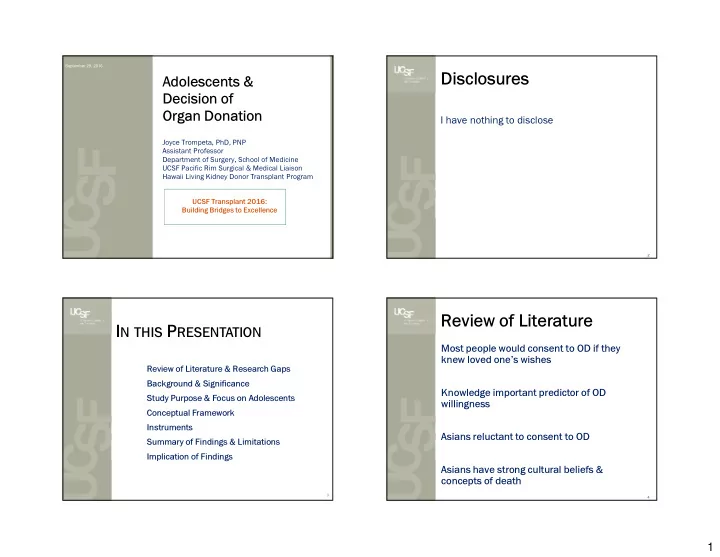

September 29, 2016 Disclosures Adolescents & Decision of Organ Donation I have nothing to disclose Joyce Trompeta, PhD, PNP Assistant Professor Department of Surgery, School of Medicine UCSF Pacific Rim Surgical & Medical Liaison Hawaii Living Kidney Donor Transplant Program UCSF Transplant 2016: Building Bridges to Excellence 2 Review of Literature I N THIS P RESENTATION Most people would consent to OD if they knew loved one’s wishes Review of Literature & Research Gaps Background & Significance Knowledge important predictor of OD Study Purpose & Focus on Adolescents willingness Conceptual Framework Instruments Asians reluctant to consent to OD Summary of Findings & Limitations Implication of Findings Asians have strong cultural beliefs & concepts of death 3 4 1
Research Gaps Backgroundon Organ Donation & Lack of research with AAs & OD Transplantation Attitudes/knowledge of AAs remain largely unexamined, especially in adolescents Over 120,000 people on organ transplant waiting list In Hawaii, incidence of kidney disease is Little research devoted to importance of family 33% higher than the U.S. national discussion & OD average In 2014, only 3% of U.S. organs donated Lack of reliable, valid, culturally sensitive from Asian Americans compared to 69% instruments organs from Caucasians UNOS (2016); NKF (2014) 5 6 Significance Revised Uniform Anatomical Gift Act Asian Americans: Most diverse & fastest growing ethnic group 50% ↑incidence ESRD than Caucasians In 2008, Hawaii enacted the Revised Uniform Anatomical Gift Act, under which first- Demand for kx tx likely to ↑ as young Asian person authorization to population ages become an organ donor is legally binding 7 8 2
Why Adolescents? Study Purpose & Development of critical/abstract thinking Importance skills Examined Attitudes, Beliefs & Lifelong behaviors are being formed Knowledge about Organ Donation & Transplantation among Asian Adopt meaningful moral standards, American Adolescents values & belief systems Stimulate family conversation at home Organ Donation Card Prepare to decide whether to sign organ donor card upon applying for driver’s license Influence to promote organ donation 9 10 Attitude Acculturation towards organ donation Willingness/Intent to Donate Becomes way in which individuals incorporate values & behaviors with Knowledge of the dominant society they live organ donation May help explain or predict Family Discussion attitudes/knowledge Acculturation Level of Adolescent Conceptual Framework 11 12 3
Sample Questions Sample Questions Suinn-Lew Asian Self-Identity Organ Donation & Transplantation Acculturation Scale (SL-ASIA) Knowledge Survey (ODTK) “What language do you prefer to speak?” “My religious beliefs do not support organ donation” “I could need an organ transplant at some time in “What generation are you?” my life” “Racial discrimination prevents minority people from “What is your food preference at home?” receiving organ transplants they need” “A patient can receive an organ transplant from a “Rate yourself on how much you believe in living donor” American (Western) values” Trompeta JA et al. (2010). Development of the organ donation & transplantation knowledge survey for Suinn et al. (1992). The Suinn-Lew Asian Self-Identity Acculturation Scale: Concurrent and factorial Asian American adolescents. Transplantation Proceedings , 42, 1427-1431. validation. Educational and Psychological Measurement , 52,1041-1046 13 14 ADOLESCENTS N=121 16 years old 52.1% (N=63) Findings 17 years old 47.9% (N=58) Juniors 55.4% (N=67) Seniors 44.6% (N=54) Attitudes / Knowledge / Willingness to Donate Females 71.9% (N=87) Mean Std. Deviation Males 28% (N=34) Opposing organ donation 2.01 .35 Born in U.S. 98% (N=117) Approving organ 2.84 .31 donation Born in Hawaii 88% (N=103) General organ donation Mixed Ethnicity 78.5% (N=95) knowledge 3.10 .38 >= 2 Asian Ethnicities 42.1% (N=51) Willingness to donate 3.20 .74 organ Religious Affiliation 62.3% (N=73) Unreported/No 37.7% (N=48) Religious Affiliation 16 4
Findings Suggest Findings Positive Attitudes & Knowledge Has discussed own wishes about OD with family associated with Willingness to Donate & Family Discussion 60 Frequency 40 High acculturation level affects 20 willingness to donate; however, no association with Family Discussion 0 Strongly Disagree Disagree Agree Strongly Agree Has discussed own wishes about OD with family 17 18 Limitations S UMMARY OF F INDINGS High ethnic mix Willingness to donate associated with: positive knowledge related to general Self-selected aspects about organ donation Highly acculturated high level of acculturation low level of negative attitudes Gender SES Asian American adolescents with positive attitudes were likely to engage in family discussion about organ donation Trompeta JA et al. (2012). Asian American adolescents and their willingness to donate and engage in family discussion about organ donation. Progress in Transplantation , 22:1,33-40 . 20 19 5
I MPLICATION OF F INDINGS To reinforce & maintain high levels of Thank you! knowledge & positive attitudes ~ organ donation education is most likely needed in high schools Trompeta JA et al. (2012). Asian American adolescents and their willingness to donate and engage in family discussion about organ donation. Progress in Transplantation , 22:1,33-40. 21 6
Recommend
More recommend